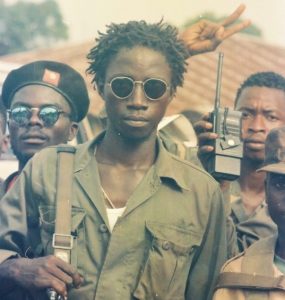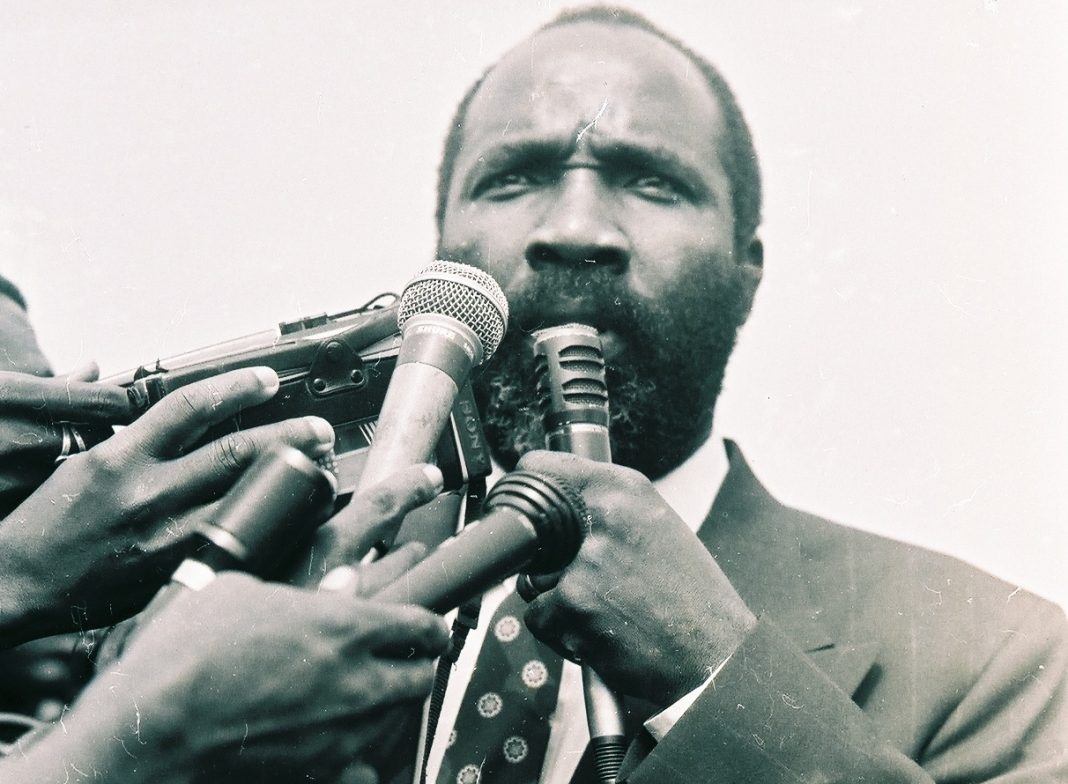By James Kokulo Fasuekoi & Issa Mansaray | The AfricaPaper
The US Eastern District Court of Pennsylvania has become the venue for prosecuting African war criminals, particularly those involved in the Liberian civil conflict. On Monday, the court takes up the trial of Jucontee Thomas Woewiyu, the rebel spokesman for Charles Taylor’s NatIonal Patriot Front of Liberia (NPFL).
Woewiyu is accused of having committed numerous war crimes both as Minister of Defence under Taylor’s regime and as key actor in the rebel NPFL. In addition, the U.S. government has also charged Woewiyu with seven counts of perjury, two counts of trying to fraudulently obtain U.S. citizenship, and multiple counts of fraud and making false statements.
U.S. Court Role
Authorities continue to hunt West African nation’s war criminals to face trial – one after another – for crimes ranging from fraud and to war crimes. In April, the Pennsylvania court sentenced Mohammed Jabbateh – aka “Gen. Jungle Jabbah” – to 30 years in a federal prison, a jail sentence considered far overdue by many war crime experts and Liberian war victims interviewed by The AfricaPaper.
Numerous War Crimes
In Liberia, impunity remains the order of the day. Not a single person from the more than eight warring factions has been tried or held responsible for the mass killings and war crimes after two seperate brutal wars in 1989 and 2003. The administration of current President George Weah has yet to address the issue.
Woewiyu, nevertheless, isn’t standing trial for alleged war crimes he and his forces may have committed on Liberian soils because of US judicial technicality. In order to prosecute him, US authorities are now using his reported attempt at trying to “obtain” US immigration benefits via fraudulent means.
(The AfricaPaper will be following Woewiyu’s case as it proceeds. Check the website for future coverage.)
Precedent? Thirty Years for Jabbah
A Liberian refugee in Pennsylvania, Jabateh had fled persecution and likely death at the hands of invading rebels in his country during a brutal civil war in the 1990s. In April, he found himself sentenced to 30 years on perjury and immigration fraud charges for concealing his horrific war history while seeking asylum in America.
Jabateh, 51, was also found guilty by a jury last October in Philadelphia after a two-week trial for subjecting a large group of Liberians, mainly civilians, including women, to inhumane acts – acts as horrific as those he and his family fled from. While he wasn’t directly charged for crimes against humanity they “factored” into Judge Paul Diamond’s sentencing.
Judge Diamond went beyond normal US immigration guidelines to give a harsher punishment due to what he called “the egregiousness of [Jabateh’s] lies” as a way to deter would-be war criminals from taking advantage of the US immigration system.
Prosecution lawyers informed The AfricaPaper that Jabateh, a former rebel commander for the United Liberation Movement for Democracy in Liberia (ULIMO), and ULIMO-K, also known by the nom-de-guerre “Gen. Jungle Jabbah,” received one of the highest prison terms ever given to someone convicted of perjury and immigration fraud in recent US history.
Nothing to Say
Sentencing took place at the U.S. District Court for the Eastern District of Pennsylvania where Jabateh stood trial last year. Jabateh had been convicted on two counts, each of fraud in immigration documents and perjury under federal indictment. In a packed courtroom were Jabateh’s own relatives including one of his sons.
Asked by Judge Paul S. Diamond to make a statement, the ex-rebel fighter responded with an unassuming demeanor, “Your honor, I have nothing to say.”
After his arrest in April 2016, federal prosecutors accused Jabateh of either personally committing or ordering his ULIMO-K fighters to carry out mass murder, torture, public rape, sexual enslavement of women, enslavement of noncombatant civilians, recruitment of child soldiers, execution of POWs, forced labor, mutilation of corpses and killings motivated by race, culture, religion, ethnic, or political differences.
Violent Defendant
“This defendant committed acts of such violence and depravity that they are almost beyond belief,” U.S. Attorney William M. McSwain stated, according to a press statement released by the US Attorney’s office of the Eastern District of Pennsylvania. “This man is responsible for atrocities that will ripple for generations in Liberia.”
In court, Jabbah’s past came to haunt him as he faced victims of his brutality, and whose relatives he killed without mercy. Ironically, Liberia appears not ready to set up a War Crimes Court despite the desire by many Liberians at home and abroad to finally address the country’s dark history.
“In one instance, Jabateh ordered the heart of a captive be cooked and fed to his fighters. In another, fighters under the defendant’s command murdered a villager, removed his heart and ordered the the town chief’s wife to cook it. Jabbateh later had the town chief himself murdered and ordered his widow to cook her husband’s heart,” said the statement.
Jabateh’s Cooks and Slaves
During Jabateh’s trial that lasted two weeks, about two dozen witnesses, 17 of whom were victims, accused the ex-guerrilla commander of commandeering them from their home towns and villages in Liberia’s hinterland at gunpoint and enslaving them in the jungles of western Liberia.
Some of the women testified that their tasks included cooking food for Jabateh and his men and having sex with him at his urging. The men said they were sent out in the fields to work daily farming and digging gold and diamond to fuel his war. Two of Liberia’s award-winning photojournalists who covered the brutal wars of the 90s were also among witnesses.
“Old Scores” for Pagano
Jabateh’s lawyer, Greg Pagano, denied all allegations against his client – and even when a victim-witness with a missing ear stepped forward and testified that it was Jabateh who ordered his rebels to cut off his ear, Pagano still disputed the allegation and requested government prosecutors to provide “forensic evidence.”
“These are tall tales of enemies settling old scores, not because they had personal experiences with him but because of what group he’s identified with,” he told the court.
In court, witnesses and Jabateh’s victims suggested that Pagano should take a trip to Liberia to define his “old score” defence for a brutal client.
However, in an opening statement to the court Thursday moments before sentencing, Judge Diamond lauded witnesses for their testimonies in the trial.
[Editor’s Note: The judge also mentioned as “helpful” the testimony of the author of this article, a former war journalist whose war-photographs of the accused, and his later encounter with Jabateh in Philadelphia years ago, helped the judge confirm that the court had the right suspect. You can read more about the government’s subpoena, James Kokulo Fasuekoi’s war reporting, and his testimony here.]
Trials Abroad

Jabateh is not the only ULIMO-K rebel commander arrested and tried abroad in recent years for alleged war crimes in the civil war. Alieu Kosiah, a tribesman of Jabateh and former rebel ULIMO-K commander in upper Lofa County region is still on trial in Switzerland and his case is currently awaiting adjudication. Kosiah was arrested in Bern by Swiss authorities for similar war crimes charges in 2014.
Kosiah is accused of persecuting, terrorizing and killing civilians who differed in ethnic, religious and cultural beliefs to Kosiah’s and his rebel group, particularly members of the Lorma tribe.
It is estimated that about 300,000 Liberian and foreign nationals were killed in both wars, the first occurring between 1989 and 1997 and the second between 1999 to 2003. None of the warlords or foot soldiers of former warring factions responsible for numerous genocides that spanned across the country have been arrested or tried in Liberia itself, including the national army.
Rise of Jabateh and ULIMO
Jabateh’s ULIMO rebel group was the first resistance movement to emerge from Sierra Leone to battle against Charles Taylor’s Gio and Manor-dominated NPFL which singled out Krahns, Sarpos, and later Mandingos during the initial stages of the war for persecution and murder.
Soon, the faction made inroads and fought its way through western Liberia to the Po River near Liberia’s capital, having seized this strategic timber, gold and diamond rich region that had largely help fueled Taylor’s war for years.
The victory at the frontlines came with some serious political challenges at the front left unresolved. The greed for political power and unmerited wealth among the faction’s leaders led to an internal brutal armed conflict thereby resulting into a split of the faction between the two dominant ethnic groups – Mandingo and Krahn, with ULIMO-K (for Kromah) and ULIMO-J (for Johnson).
In the chaos that ensued starting from Monrovia and spreading across the faction’s controlled territories, each side lost a significant number of civilians and fighters alike to the other in the battle. While fighting lasted for a mere few months, the results very devastating, causing hundreds, especially women and children, to die of hunger and malnutrition.
Warring Factions
After their intertribal war and having been dislodged from the faction’s Tubmanburg headquarters, Jabateh’s ULIMO-K declared Voinjama, Lofa County (located along the border with Guinea) as ULIMO-K’s new headquarters.
ULIMO and ULIMO-K which were Liberia’s second largest warring factions in the war is listed in a Truth and Reconciliation Report (TRC) as being responsible for a series of atrocities in Bomi, Cape Mount, Bong and Lofa counties during the war. ULIMO-K is reported to have subjected most of Lofa County’s eight to nine ethnic groups, mainly the rival Lorma to severe persecution and killing.
ULIMO-J, on the other hand, similarly joined the Liberia Peace Council (LPC) of George Boley in southeast Liberia to settle scores with rival tribes such as Grebo and Kru over longstanding animosity related to land and cultural issues.
Jungle Jabbah is the first Liberian warlord to be tried and sentenced in America. Chuckie Taylor, an American and son of former warlord and president Charles Taylor, was sentenced in 2009 for crimes against humanity during the war in neighboring Sierra Leone and in Liberia.
Who is Next?
The trial of Jucontee Thomas Woewiyu, former NPFL’s defense spokesperson who faces immigration fraud charges much like Jabateh, starts Monday.
During a series of press interviews during the course of the trial, some of Jabateh’s relatives made insinuations that many of the witnesses brought in from Liberia to provide testimony in October volunteered to testify only because they were hopeful they could stay and work in the US after the trial – a way to escape the hardship at home in Liberia.
However, The AfricaPaper staff directly confirmed that all witnesses left the United States for Liberia, immediately after their respective testimonies, reporting also verified by the government prosecution office in Philadelphia in late October. |TAP|










































